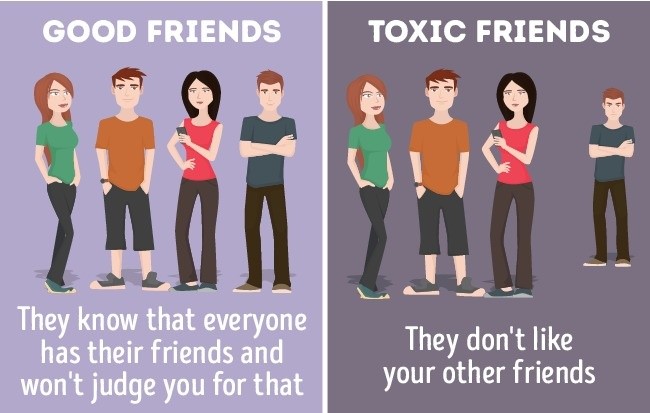Everyone in your friend group has a role. You have carefree friends who are always informed of the happenings in the city. You have the mom friend who always takes care of everyone. And there’s the toxic friend who only talks about themselves and doesn’t contribute anything but their problems to the group.
Your sentimental feelings about your friends may get in the way of identifying the toxic one, but if you keep them in the friend group long enough, their negativity might rub off on you. Here’s how to identify them right now:
Tell Them You Need Some Alone Time

A toxic friend always needs people to listen to their problems even if they don’t follow the advice you give them. But let’s be real: you need time for yourself, too. The way they react to you telling them you need to focus on yourself will show a lot about their personality. A real friend will give you the space you need without making you feel guilty about it. A toxic friend, on the other hand, will make it all about them. They might come up with different assumptions as to why you don’t want to hang out. They’ll feel abandoned because they’ve become so dependent on your attention on them.
Ask Them a Favor
Say you’re too busy with work to meet your friends. Maybe you’re installing Rolling TV stands for flat screens or waiting for the delivery of that skin toner online purchase you made yesterday. Or maybe an Amazon package is bound to arrive and you need to stay home to receive it. Ask them to cover for you and see what they’ll do. If they use this against you and say you owe them one, that doesn’t necessarily mean they’re a toxic friend. It’s human nature. However, if they make you feel bad in front of your other friends, that’s not a good sign. They could come up with an upsetting story telling everyone you didn’t want to meet up. And when you confront them about it, they might just turn it around on you.
Listen to Their Problems

Everyone has their fair share of problems. You may have work-related issues you need to vent about sometimes. You may have encountered a disrespectful person on the way home. These are all valid and you’re not toxic for wanting to release some of the stress you felt from the experience. You’re also expected to listen to your friends’ problems, and this might even be a good opportunity to see if the friendship is toxic. If your friend talks about the littlest things as if they were the biggest problem, they might be blaming all problems on external factors without being accountable for their own actions. If you talk about a problem you’ve had with them in the past, the way they recall the situation and make themselves the sole victim is also a clue to their toxicity.
You don’t need a hundred friends to live a happy life. You’d be better off with a handful as long as no one is toxic and bringing you down.
